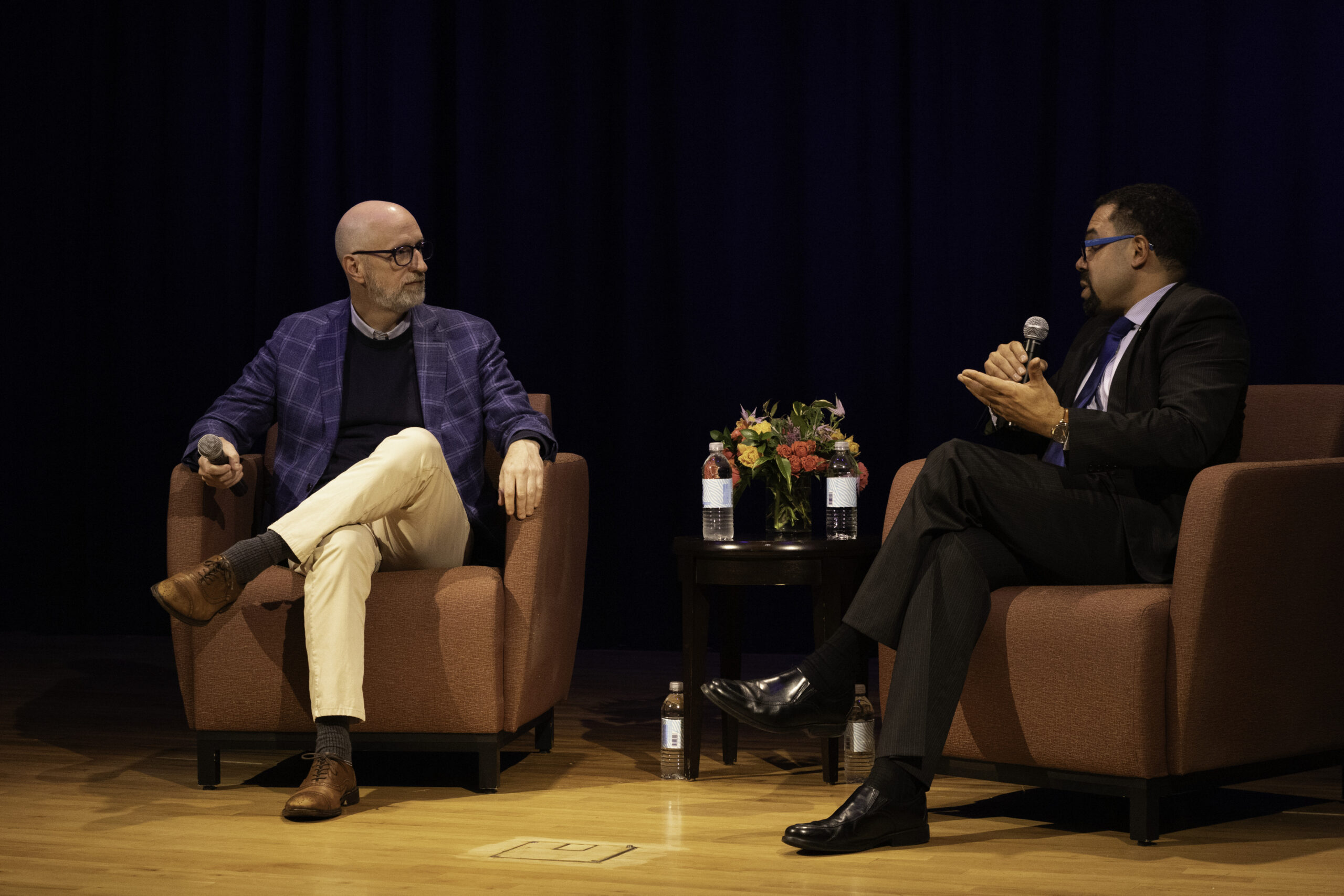David French emphasizes dialogue across differing viewpoints in talk with Purnell
November 1, 2024
 Riley Nelson
Riley NelsonOn a rainy Wednesday night, students, staff and faculty joined Brunswick community members in Kresge Auditorium for a political conversation between two men of opposing opinions. David French, a columnist at the New York Times and former senior writer at the National Review took the stage with Associate Professor of Africana Studies and History Brian Purnell. French is an Evangelical conservative from the South and Purnell is a liberal Catholic from Brooklyn.
The evening was organized by the Office of Inclusion and Diversity as the last in a series of lectures and talks aimed at understanding the political climate in the United States as the presidential election nears. Benje Douglas, senior vice president for inclusion and diversity, welcomed everyone to the event before introducing the two speakers, explaining the reason behind bringing together two people with different opinions for an open conversation.
“Things are tough, and they’ve been for some time. Our goal [is] to discuss how we should discuss those things with each other and the importance of the conversation,” Douglas said. “[The conversation is] largely an extemporaneous example of how to engage with a person where you might have points of agreement and points of disagreement. This is not a debate. There will not be any scores.”
The hour-long discussion began with Purnell complimenting the work he had read by French and thanking French for having enough trust to join him in a public political conversation where French had been given no prior talking points to prepare. Purnell then asked his first question about French’s opinion on the Dobbs decision that overturned Roe v. Wade and his perspective on abortion.
French used the question to explain a facet of what he believed has contributed to the fall of the Republican Party, of which he is no longer a member.
“I believe that the [Dobbs] decision was right, but that it was landing when the [political] right was wrong,” French said. “What I was seeing arising on the right was a much more vengeful and angry spirit—something that was, instead of approaching people with a position of holistic love and care, was approaching people from a position of punitive judgment.”
The hatred French described as having infiltrated the Republican Party opened the conversation up to a discussion of the broader danger of hatred in American democracy.
“It is very easy to persuade someone to protect the free speech rights of someone they disagree with.… It is not easy to persuade someone to respect the free speech rights of someone they hate,” French said.
French said hatred is a prevalent part of American politics, especially between members of opposing parties. He traced the rise in hatred to a rise in misinformation and a lack of an accurate understanding of the people on the opposite side. Although he said animosity between party lines is increasing, French also claimed individuals do hold the power to shift this dynamic.
“One of the most transformative things you’ll ever do in your life is defend the rights of someone you disagree with,” French said. “If you see someone being mistreated, move in their favor. Don’t ask, ‘Okay, where do they stand on the panoply of issues?’ If you see someone being mistreated, move in their favor.”
Purnell closed the conversation by thanking French for his participation and open-mindedness before the last thirty minutes of the night were turned over to questions from the audience.
Evan Braude ’28 brought up the challenge of having open and diverse political dialogues at the College, a place where, she feels, everyone seems to share a consensus in their political views.
“It’s way too simplistic to say, especially if you live in a monoculture, ‘Go make friends from the other side,’” French said. “It’s just not that simple. What I say is, we need to be intentionally curious … [and] seek out the best expression of the other side’s point of view. Find the smartest people on the other side, and read them—not the dumbest people on their side, not the most malicious people on the other side, because they’ll just reinforce how smart you are.”
French also addressed questions about the possibility of violence, especially as political tensions rise with the presidential election next week. Ending on the uncertainty of the election, French explained how he sees it as a defining moment not just for its policy outcomes but for the way it will shape the American political spectrum.
When the question and answer part of the evening ended, the conversation continued as some of the attendees headed to Thorne Hall for dinner discussions. Braude, in an interview with the Orient after the talk, spoke about how she believed the event emphasized the need for diverse political thought on campus.
“Coming from the South,… one of my critiques of the Bowdoin community is the fact that I feel like it’s so ideologically liberal. It’s so liberal that I feel like there’s not a space for people who potentially disagree. Even though I agree with the majority, I think it’s still dangerous for us,” she said.

Comments
Before submitting a comment, please review our comment policy. Some key points from the policy: